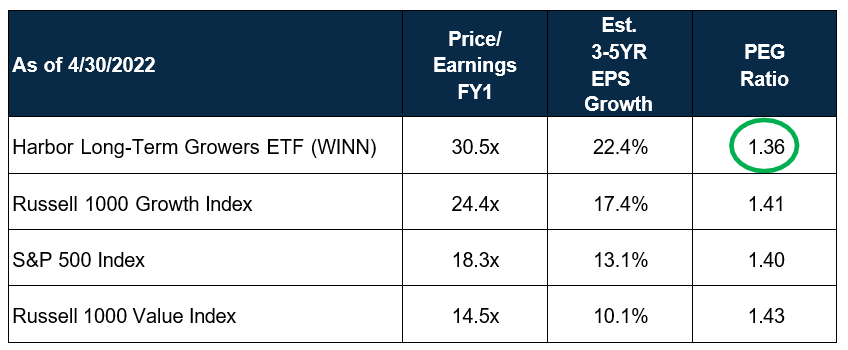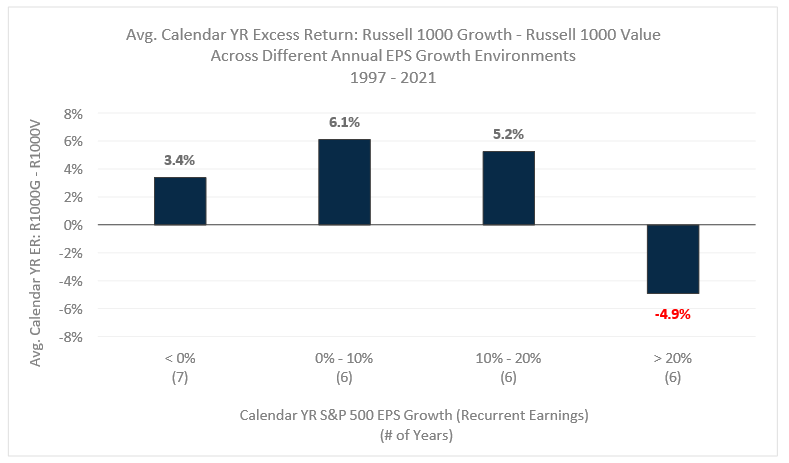Current volatility creates future opportunity

Federal Reserve Chair Jerome Powell delivered comments indicating it was “time to retire transitory inflation” during congressional testimony in late 2021, which has proven a pivotal moment for equity markets. Powell’s comments raised investor expectations for greater persistence of inflationary pressures, more aggressive monetary policy tightening, and higher interest rates.
This has prompted sharp investor rotation away from duration growth stocks given increased concerns regarding future cash flows being worth less when discounted back to the present at a higher rate. Within this backdrop, the Russell 1000 Growth Index has returned -20% year-to-date (as of 4/30/2022) and Morningstar’s U.S. Large Growth category (open end mutual funds +ETFs) has experienced substantial estimated net outflows (please refer to the tables below) alongside fixed income and other growth categories.

Source: Morningstar Direct, May 2022
Given market shifts and macroeconomic developments, investors are now increasingly weighing asset allocation and manager decisions within the US large cap growth space.
Despite elevated volatility, today’s environment likely enables long-term investment in higher growth stocks at more attractive valuations within a potentially more favourable future backdrop of decelerating economic growth. As such, we believe the actively managed Harbor Long-Term Growers ETF (Ticker: WINN) sub advised by Jennison’s seasoned Large Cap Growth investment team warrants increased investor attention.
Paying less per unit of growth for faster growth companies
Since Powell’s pivot in November 2021, price-to-earnings multiples for growth stocks have exhibited meaningful compression. In fact, the price/earnings (FY1) ratio for the Russell 1000 Growth Index declined from 31.7x as of 11/30/2021 to 24.4x as of 4/30/2022, a compression of -23%. As multiples have declined across the space, the Harbor Long-Term Growers ETF (ticker: WINN) has maintained investment in companies with stronger earnings growth profiles.
As a result, WINN’s price/earnings to growth (PEG) ratio has trended lower and now resides below those of the Russell 1000 Growth, S&P 500 and Russell 1000 Value Indexes (please refer to the table below). This means that despite sourcing companies with stronger levels of earnings per share expansion, WINN is now paying less per unit of growth versus the represented benchmarks below.

Source: FactSet Research Systems, April 2022
Long-term growth in a scarcity of growth environment
Following strong economic expansion in 2021, many U.S. GDP forecasts are now pointing to near-term deceleration of economic growth with conditions normalizing moving forward. In fact, recent FactSet estimates indicate that U.S. Real GDP is likely to slow in 2022 to 3.2% and return to pre-pandemic levels of 2.3% in 2023.
As economic growth decelerates, WINN’s investment team anticipates that S&P 500 earnings per share (EPS) growth will decline to more normalized levels while WINN’s stronger EPS growth profile is expected to remain relatively steady.
Importantly, periods of normalised S&P 500 EPS growth have historically favored WINN’s investment style, as well as growth stocks relative to value equities. The chart below shows the average calendar year excess returns of the Russell 1000 Growth Index versus the Russell 1000 Value Index over different annual S&P 500 EPS growth ranges from 1997 to 2021.
On average, the most favourable environments for growth outperformance have been in years where S&P 500 EPS growth has ranged between 0% to 10% and 10% to 20%. These ranges are reflective of more normalized levels of S&P 500 earnings per share expansion; the Index’s average annual EPS Growth has been 9.5% over the last 25 years.

Source: FactSet Research Systems, May 2022
Looking ahead, as the delta in earnings growth between the Harbor Long-Term Growers ETF and the overall market widens, WINN should likely be rewarded for finding long-term growth in a scarcity of growth environment.
Conclusion
In the face of elevated volatility, it is often important to look through shorter-term periods of uncertainty to potentially realise longer-term investment objectives. Investing in the Harbor Long-Term Growers ETF (WINN) enables investor access to Jennison’s seasoned Large Cap Growth team and their time-tested philosophy and approach, all within a fully transparent ETF offering enhanced liquidity and tax-efficiency.
Importantly, WINN is now paying less per unit of growth for faster growth companies in a slowing growth environment. As such, we believe WINN provides investors both a timely and long-term opportunity given the expertise of the investment team and a potentially more favourable backdrop for their disciplined emphasis on companies with sustainable competitive advantages and long-term growth.
Find more expert insights about the wealth management industry here >>
Important Information
For Institutional Use Only. Not for Distribution to the Public.
The views expressed herein may not be reflective of current opinions, are subject to change without prior notice, and should not be considered investment advice.
Investors should carefully consider the investment objectives, risks, charges, and expenses of a Harbor fund before investing. To obtain a summary prospectus or prospectus for this and other information, visit harborcapital.com or call 800-422-1050. Read it carefully before investing.
Investing involves risk, principal loss is possible. Unlike mutual funds, ETFs may trade at a premium or discount to their net asset value. The ETF is new and has limited operating history to judge.
Shares are bought and sold at market price not net asset value (NAV). A fund’s NAV is the sum of all its assets less any liabilities, divided by the number of shares outstanding. Market price returns are based upon the closing composite market price and do not represent the returns you would receive if you traded shares at other times.
The Morningstar Actively Managed Large Cap Growth Funds Universe represents all funds categorized as Large Cap Growth by Morningstar, excluding those categorized as Index Funds. The Morningstar Large Cap Growth Universe represents all funds categorized as such by Morningstar. The Morningstar Large Cap Growth Universe (MF+ETF) represents all funds and ETFs categorized as such by Morningstar.
The Russell 1000® Growth Index is an unmanaged index generally representative of the U.S. market for larger capitalization growth stocks. This unmanaged index does not reflect fees and expenses and is not available for direct investment. The Russell 1000® Growth Index and Russell® are trademarks of Frank Russell Company.
The S&P 500 Index is an unmanaged index generally representative of the U.S. market for large capitalization equities. This unmanaged index does not reflect fees and expenses and is not available for direct investment.
The Russell 1000® Value Index is an unmanaged index generally representative of the U.S. market for larger capitalization value stocks. This unmanaged index does not reflect fees and expenses and is not available for direct investment. The Russell 1000® Value Index and Russell® are trademarks of Frank Russell Company.
All investments involve risk including the possible loss of principal. There is no guarantee that the investment objective of the Fund will be achieved. Stock markets are volatile and equity values can decline significantly in response to adverse issuer, political, regulatory, market and economic conditions. At times, a growth investing style may be out of favor with investors which could cause growth securities to underperform value or other equity securities. Since the Fund may hold foreign securities, it may be subject to greater risks than funds invested only in the U.S. These risks are more severe for securities of issuers in emerging market regions. A non-diversified Fund may invest a greater percentage of its assets in securities of a single issuer, and/or invest in a relatively small number of issuers, it is more susceptible to risks associated with a single economic, political, or regulatory occurrence than a more diversified portfolio.
Note about tax-efficiency: ETFs are subject to capital gains tax and taxation of dividend income. However, ETFs are structured in such a manner that taxes are generally minimized for the holder of the ETF. An ETF manager accommodates investment inflows and outflows by creating or redeeming “creation units,” which are baskets of assets. As a result, the investor usually is not exposed to capital gains on any individual security in the underlying portfolio. However, capital gains tax may be incurred by the investor after the ETF is sold.
Foreside Fund Services, LLC is the Distributor of the Harbor Long-Term Growers ETF.